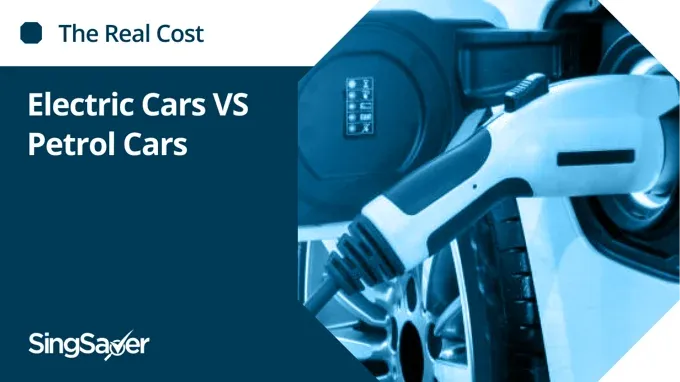Electric vs Petrol Cars in Singapore: Which Is Right for You?
Updated: 21 Jul 2025
Written bySingSaver Team
Team

The information on this page is for educational and informational purposes only and should not be considered financial or investment advice. While we review and compare financial products to help you find the best options, we do not provide personalised recommendations or investment advisory services. Always do your own research or consult a licensed financial professional before making any financial decisions.
It’s no secret that Singapore has seen a growing interest in electric vehicles (EVs) in recent years. Considering the government’s push for greener transport options and the increasing number of EV charging stations available, you may be wondering if now's the moment to make the switch. However, you want to make sure that you are choosing the right car for your needs and budget. Let's compare electric and gas cars to help you weigh your options.
How electric and petrol cars function
Before we get into a detailed comparison, let’s take a look at the mechanical differences between electric and gas-powered vehicles. Here's a simplified breakdown:
Electric cars
As the name suggests, EVs utilise an electrical current that flows in multiple directions to power the vehicle. This means that they produce no tailpipe emissions. The car's battery stores direct current (DC), which is converted to alternating current (AC) by an inverter. This electrical energy is then transformed into a magnetic field that propels the wheels. Unlike petrol cars with multi-speed transmissions, electric cars have a single-speed transmission.
Petrol cars
Petrol cars rely on an internal combustion engine for movement, which draws a mixture of gasoline and air into a piston. The piston compresses this mixture and an electrical spark ignites it. When the piston is forced downwards, a connecting rod transfers this energy to the crankshaft, which rotates the wheels. Exhaust gas is expelled through the tailpape when the piston moves back up. Petrol cars employ multiple engine cylinders, with oil lubricating the moving parts and a coolant system that prevents overheating.
Now that you have a basic understanding of their operational differences, let's proceed with a comprehensive comparison of electric vs. petrol cars.
Looking to purchase your next car in Singapore?
Get started by exploring the auto loan options that will allow you to finance your new vehicle without worries.
How are the costs calculated?
The total cost of owning a car extends beyond the initial purchase price. You also need to consider ongoing expenses like maintenance, repairs, fuel, and potential tax credits. Let’s take a look at how electric cars fare against petrol cars in these aspects:
Upfront costs
Generally, EVs come with a higher initial purchase price than petrol cars. This can be attributed to import fees and the newer technology involved in their production. As a baseline, you can expect to pay around $180,000 for an EV compared to $130,000 for a gas-powered car.
When examining the most budget-friendly options in each category, the price difference remains significant. The least you can expect to spend on a petrol car comes in at just a little over $105,000, whereas the absolute minimum you will need to spend on an EV is somewhere around $170,000.
Keep in mind that all-electric cars are not common in Singapore as owning one requires owners to have access to a charging station. As such, EVs in Singapore are mostly hybrid electric cars, which carry both a fuel tank and battery pack.
Verdict: Petrol cars are still more accessible for most Singaporean buyers.
Fuelling/charging costs
Let’s take a look at the factors that go into determining the price of petrol and electricity. With petrol, the price of crude oil is a huge consideration, which is affected by supply and demand that can be influenced by geopolitical events. On top of that, you are paying taxes, distribution and refining charges. Other factors to take into account are the size of your vehicle, the type of engine it utilises as well as its fuel economy. Although petrol prices are always changing, you can expect to pay around $2.65/l (as of April 2025), with a total cost of $119.25 for a 45L car.
Electric cars, on the other hand, make use of three types of chargers. Level 1 has the slowest charging rate and is usually utilised overnight while Level 3 has the fastest charging rate as it makes use of direct current (DC). Energy is measured in kilowatt hours (kWh) and the size of the battery will determine the full charge rate of the EV. With electricity costing $0.3065/kwH (as of April 2025), it would cost $29.42 to charge an electric car with a 96kwH battery.
Verdict: Charging an EV is significantly cheaper over time.
Maintenance and repair costs
Because electric cars come with much simpler mechanical systems compared to petrol cars, they require fewer fluid changes and part replacements. Their electrical systems also demand minimal upkeep. Consequently, you can anticipate spending less on maintenance and repairs for an EV than its petrol-powered counterpart. Even the expense of replacing an EV battery is unlikely within the initial years of ownership. EV batteries are engineered for longevity, often lasting a decade or more.
Due to these factors, maintaining an electric vehicle could be up to a third less expensive than maintaining a gas vehicle during the first five years – and potentially half as expensive over the vehicle's lifespan. However, it’s important to remember that owning an EV doesn't eliminate routine maintenance entirely. You will still need to care for your tires, headlights, windshield wipers, and brakes. In contrast, routine maintenance for gas cars involves regular oil changes, tire rotations, air filter replacements, and scheduled services at specific mileage intervals.
Verdict: EVs require less frequent maintenance and come with a cheaper lifetime cost.
Government incentives
In Singapore, the government has pushed out several incentives to encourage car owners to go electric. This includes the EV Early Adoption Incentive (EEAI), which offers 45% off the Additional Registration Fee (ARF) up to 31 December 2025. In addition, the Electric Vehicle Common Charger Grant (ECCG) will co-fund the installation of 3,500 EV chargers in non-landed private residential areas.
In contrast, petrol cars are subject to the Vehicle Emission Scheme (VES), where car owners have to pay a surcharge if their vehicle produces higher emissions.
Verdict: EVs benefit more from current government incentives.
Your car and the environment
Environmental concerns may also be important to you when making the choice between an EV and a petrol car. Let’s take a look at some of the non-cost factors that may impact your decision:
Emissions
EVs typically exhibit greater efficiency than petrol vehicles, converting over 77% of the electrical energy from the grid into power at the wheels. In contrast, traditional gas vehicles only convert between 12% and 30% of the energy stored in gasoline into usable power. It's important to remember that the specific emissions and efficiency of any electric car will vary based on your location, the specific vehicle model and the electricity source.
It might seem counterintuitive that EVs produce any emissions at all since they have no tailpipe emissions. EV emissions are calculated based on two primary sources: the processing and materials involved in their manufacturing and the emissions associated with the electricity used for charging.
One current challenge related to electric car emissions is the recycling of EV batteries at the end of their lifespan. Battery recycling is still a relatively new field. While the current recycling capacity isn't yet sufficient to meet anticipated future demand, significant advancements in this area are likely in the coming years.
Verdict: EVs are a more energy efficient option.
Need car insurance for your new ride?
Discover the car insurance plan that will best suit your needs.
Convenience
Electric vehicles typically have a greater initial purchase price but reduced running costs. Does this difference extend to everyday convenience? Here's a comparison of electric and conventional cars in terms of daily usability:
Power
With a petrol car, it’s unlikely you will have to give much thought to range. After all, gas stations are widespread and easily accessible almost everywhere. That isn’t the case for potential electric car buyers, who may experience range anxiety, or the fear of being stranded with a depleted battery and no charging options nearby.
While the EV charging station network isn't as extensive as that for gasoline, it is rapidly expanding. The convenience factor also takes into consideration the type of property you stay in, as car owners staying in non-landed properties are unlikely to have access to their own charger.
Verdict: In the current environment, petrol cars win for the convenience of refuelling but this has the potential to change in future.
Towing
Both gasoline and electric vehicles are capable of towing, though hauling a significant load will reduce efficiency for both. For petrol cars, the extent to which your speed decreases depends on the weight you are towing as well as the added wind resistance. Generally, the heavier the load, the more your fuel efficiency will suffer.
Electric cars also experience a decrease in range when towing heavy loads. Given that public charging stations are not as widespread as gas stations and that recharging takes longer than refuelling, EVs might not be ideal for long-distance towing, although shorter towing tasks shouldn’t be a problem.
Verdict: Petrol cars are more efficient for towing.
Availability
Despite their increasing popularity, EVs still aren’t as common as petrol cars. The truth is that the demand for eco-friendly EVs is increasing at a faster pace than dealerships can maintain inventory. On top of that, Singapore is still in the process of building an infrastructure that will support the purchase and utilisation of EVs.
On the flip side, petrol car buyers can take their pick from a wide selection that ranges from budget to luxury options.
Verdict: There are a lot more petrol car options on the market when compared to EVs.
The best car for you will depend on your budget and priorities
Both electric and petrol cars present a unique set of pros and cons. Environmentally, EVs are the clear frontrunner, also excelling in fuel efficiency, lower maintenance expenses and available government incentives. However, electric car range can be significantly reduced when towing, charging takes considerably longer than refuelling and you don’t have as many options to choose from when purchasing an EV.
Petrol cars hold advantages in terms of initial purchase price, driving range, suitability for long-distance towing and the convenience of quick refuelling. However, they fall short in fuel efficiency, incur higher maintenance costs and have a greater environmental impact.
Ultimately, you should make the choice based on your individual budget, lifestyle, and transportation needs.
About the author
SingSaver Team
At SingSaver, we make personal finance accessible with easy to understand personal finance reads, tools and money hacks that simplify all of life’s financial decisions for you.
